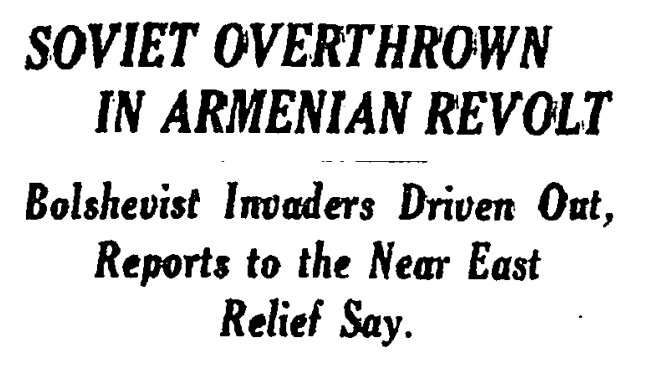It seems February is a good time of year for Armenians to express their disgust and dismay with overlords who have gotten far too overbearing.
Thirty years ago, the Karabagh (Artsakh) Movement for national liberation commenced with peaceful protests in Yerevan and Stepanakert. The rest, as they say, is history of course. Baku’s rulers, in keeping with traditions established by their invading/marauding/occupying ancestors responded with brutal reprisals and bloodshed, resulting in massive refugee flows in both directions, and a war. Armenians won, big, and Baku is still whimpering and whining instead of accepting the consequences of its ill-considered, barbaric, policies.

Yet in some ways, we, Armenians, had a much more massive effect on the course of world affairs and politics as a result of this effort to restore to Armenian governance a small part of our massive territorial losses. The hundreds of thousands who poured into the streets created the first cracks in the Soviet wall. Subsequently, other subjugated nations and all soviet citizens felt empowered to take on the repressive system that they had lived under for seven decades. Ultimately, that system collapsed.
This was the latter day bookend.
But 97 years ago, again in February, a similar outburst of popular will and power forced out a brutal Soviet regime that was axe-murdering some of the finest leaders we had had in centuries. The generation of leaders who suffered through and survived the Armenian Genocide was also the one that had culminated the rebirth of Armenian awareness. These were incredibly dedicated people who seemed to thrive off self-sacrifice. When the people learned what was happening behind prison walls, they rebelled, and briefly restored the independence of Armenia, saving countless leaders—mostly Armenian Revolutionary Federation (ARF) members—who subsequently built the infrastructure that sustained the Diaspora for three generations until the re-liberation of our small republic. This was the only instance of a successful uprising against Soviet rule until the breakup of the USSR triggered by the Artsakh National Liberation Movement.

That was the older bookend.
This gives us much to celebrate, though that joy is tempered by the awareness of the price in lives and terror, paid both in 1921 and the 1988-1994 period.
It also inspires hope that we can use that rebellious spirit to continue pushing for improvements in the lives of our homeland-dwelling compatriots. A grand example is the demonstrative act, direct action, political theatre, or whatever else you might choose to call it, implemented just days ago by Sona Aghegyan and Marina Khachatryan (members of the Yerkir Tsirani party) who are members of Yerevan’s city council. They brought, for Yerevan’s mayor, a sample of sewage, retrieved off the streets, from the Nubarashen neighborhood to expose the unsanitary conditions in which the residents of this largely poor section of the city must live. I read somewhere that, already, repairs to the sewer system are under way. If this is indeed true, then we have yet another great reason to celebrate our rebellious February.
Let’s keep up this spirit. Boldly standing up to injustice, even with otherwise unpleasant techniques, is nothing but justice embodied. And we in the Diaspora should be screaming at the top of our lungs—long live the Spirit of Rebellion that gave us February 18, 1921, the Artsakh movement, and the clever showmanship of Aghegyan and Khachatryan.


Be the first to comment